Editor’s note: August marked Xpress’ 30-year anniversary. Throughout September we’ll be celebrating the milestone with articles, photo spreads and reflections from current and former staff members. Thank you for reading Xpress, and please consider becoming a member.
Randy Molton still likes getting hate mail.
An Xpress contributor since May 1995, he’s distilled a local issue into cartoon form each week, chronicling Asheville’s numerous changes and challenges over the past three decades. And when his work touches a nerve with readers, they’ve consistently let him know.
“It means that people are at least paying attention, and with the exception of the rare occasion, the authors of these vitriolic missives at least spell my name correctly,” Molton says. “That said, I appreciate them and applaud their right to opine.”
As part of our monthlong 30th anniversary retrospective, Xpress spoke with this longtime freelancer about his professional journey, creative process and what keeps him motivated in an industry that increasingly undervalues the role of cartoonists. Molton also shared with us some of his favorite illustrations that he’s drawn for Xpress over the previous three decades.
Style guide
A native of Augusta, Ga., Molton moved across the South in his youth as his father worked at various newspapers — including the Asheville Citizen-Times from 1960-62. In 1967, the family moved to Hendersonville after his father was hired as advertising director at the Times-News, and the younger Molton grew up there.
In 1977, Molton got into political cartooning while attending The Art Institute of Atlanta and took a course taught by Atlanta Journal cartoonist Lou Erickson. Three years later, his parents gave him Is That All You Do?, a book by Dwane Powell, editorial cartoonist of the Raleigh News & Observer.
“I wore the pages out studying his style, and his work was a big influence,” Molton says.
Molton’s first cartoon was published in April 1982 while he was living in Birmingham, Ala., and he soon started contributing to the Kaleidoscope, the student paper at the University of Alabama at Birmingham. In May 1986, Molton moved back to Hendersonville for a full-time job at the Times-News in the composing room. He also drew graphics and submitted cartoons, which ran every week from 1986-88.
In 1989, he left the Times-News and began contributing cartoons and caricatures to multiple regional papers. At the same time, he attempted to syndicate his cartoons and caricatures around the U.S.
“It became tedious, and I felt like I was spending more time trying to market my work than creating,” Molton says. “It was tough to find a balance, so I took a break and started doing other illustration projects, and later shifted to drawing caricatures at festivals until I felt I was ready to go back to the drawing board.”
In late 1994, he heard a Mountain Xpress ad on a local radio station, picked up an issue and decided to contact the editorial department. His first contribution was a cover drawing of a man with his head stuck in a pile of trash like an ostrich, which published on Aug. 31, 1994‚ Xpress‘ fourth issue.
“I liked the fact that it was an alternative newspaper, and I was impressed with the amount of local news coverage and investigative journalism,” Molton says. “For my work, it seemed like a good breeding ground for more creative latitude to produce edgier ’toons, with fewer restrictions than at a typical daily newspaper.”
At that point, Molton was heavily inspired by the work of Mike Luckovich of the Atlanta Journal-Constitution and particularly liked his wit, loose drawing style and ability to draw caricatures.
“I still [am], but in recent years, I found that my work would be more effective if I used as few words as possible and let the art speak for the issue I’m drawing about,” Molton says. “[But] sometimes it may be necessary and funnier to include a punch line with dialogue between characters. It depends on the issue and the characters.”
From brain to page
For crafting his cartoons, Molton’s creative process starts with perusing Xpress and other state or local publications for recent news stories.
“The next step is trying to simplify the story into a visual, although it’s not unusual for me to come up with the concept first and draw it,” he says.
An avid runner, Molton logs 6 or 7 miles per day and gets a lot of his ideas on his daily run, noting that “there’s something about that process that frees up my imagination.”
Back at his home office in Port St. Lucie, Fla. — where he moved in 2023 — Molton maintains regular communication with Xpress editors, emailing them a couple of finished drawings each Wednesday. They then choose which one to run the following Wednesday.
“I start out sketching my idea on a regular-sized sheet of paper and ink it with black markers and pens, followed by coloring with other markers, pens, colored pencils and crayons,” he says. “I’m old school, using a computer only to scan and send. Although I went through a time of coloring with [Adobe] Photoshop, it didn’t work as well for me, and I wasn’t as pleased with the results.”
Over the years, he’s especially enjoyed drawing cartoons that feature colorful and/or controversial characters, pointing to community journalist Chad Nesbitt, former Asheville City Council members Carl Mumpower and Cecil Bothwell, former U.S. Rep. Madison Cawthorn, former N.C. Rep. and current state Sen. Tim Moffitt, former Buncombe County Manager Wanda Greene, activist H.K. Edgerton, former City Council candidate Ukiah Morrison and former Buncombe County Sheriff Bobby Medford as examples.
“With varying degrees, they made my job easier, giving me an abundance of material,” Molton says. “Plus, my cartoons on them would more likely provoke a response from either them, the public or both.”
The long view
Providing consistent commentary on Asheville issues has granted Molton an informed perspective on the area that’s evident in his work for Xpress.
Nearly three decades ago, he notes, the city was evolving into a more unique and avant-garde spot after a time of boarded up buildings in the 1970s and ’80s. He adds that, back then, there also seemed to be more of an anti-big-box store sentiment, “with just as much focus on aesthetic atrocities as on the culture of the corporate overreach that results in the destruction of small, independently owned businesses.” As an example, he points to the gigantic Staples sign on Merrimon Avenue, which he says “became a very lucrative issue” for him in the early 2000s.
“Today, with hotels popping up all over town, I fear that Asheville is losing — if it hasn’t already lost — its individualism and seems to be a more tourist-driven, cookie-cutter town with the notion that ‘behemoth beats bohemian,’” Molton says.
Nevertheless, he stays motivated by trying to find new ways to express ideas through his art while maintaining his style of visual humor. With over 42 years as a published cartoonist, he attributes his endurance to developing “an epidermal augmentation that would rival a rhinoceros, since you can’t be thin-skinned in this business.”
Such resilience is especially laudable at a time when political cartooning jobs have been slashed at newspapers across the country. Molton is especially disheartened by cases in which cartoonists were fired for being “too controversial.”
“Unfortunately, some of them went from pushing the envelope at a newspaper to pushing the envelope in the sales department of an office supply chain store for a lot less money,” he says. “I’m old enough to remember when there were two daily newspapers in a town — morning and afternoon — and both papers had a full-time cartoonist on staff if they were in a major city. Those days are long gone, of course.”
When he’s not drawing or running, Molton contributes to Ellis Molton Advertising — the small family advertising business that his father created in 1970 — writing scripts and producing on-hold messages for various businesses. At various points in his career, he’s also been encouraged to publish a book of his cartoons but says he hasn’t gotten around to it yet.
Showing no signs of stopping, Molton plans to continue cartooning for the foreseeable future. And while more work means more hate mail, he also doesn’t mind when a message of gratitude makes its way through the negativity.
“I especially appreciate the people who like my work and get my humor,” he says. “I will try to keep them entertained for as long as I am upright and ensconced behind the drawing table.”





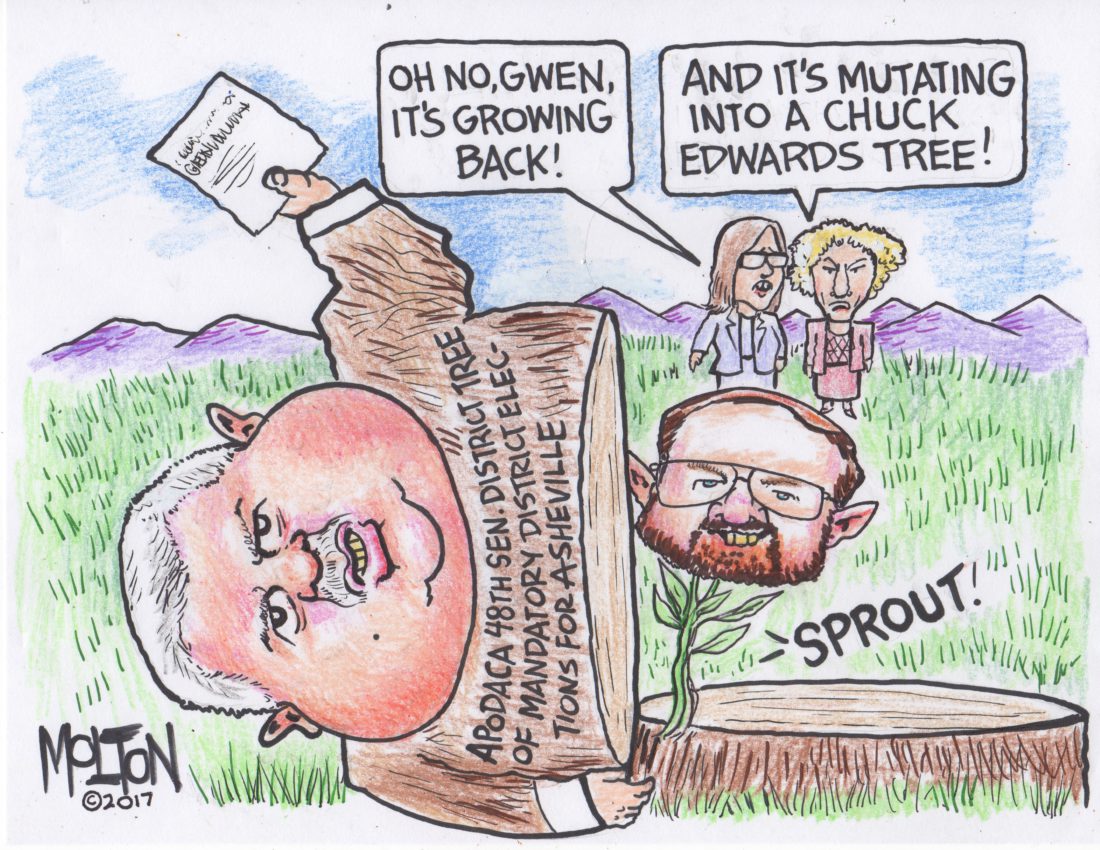
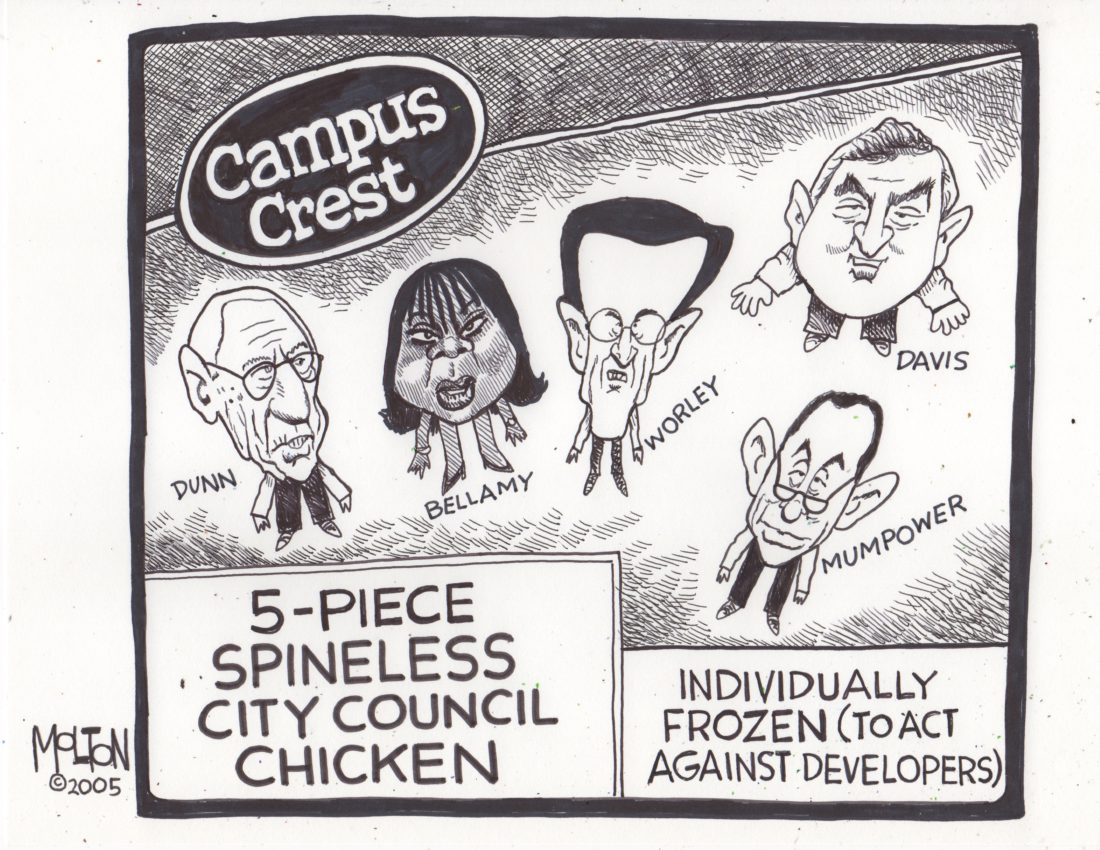
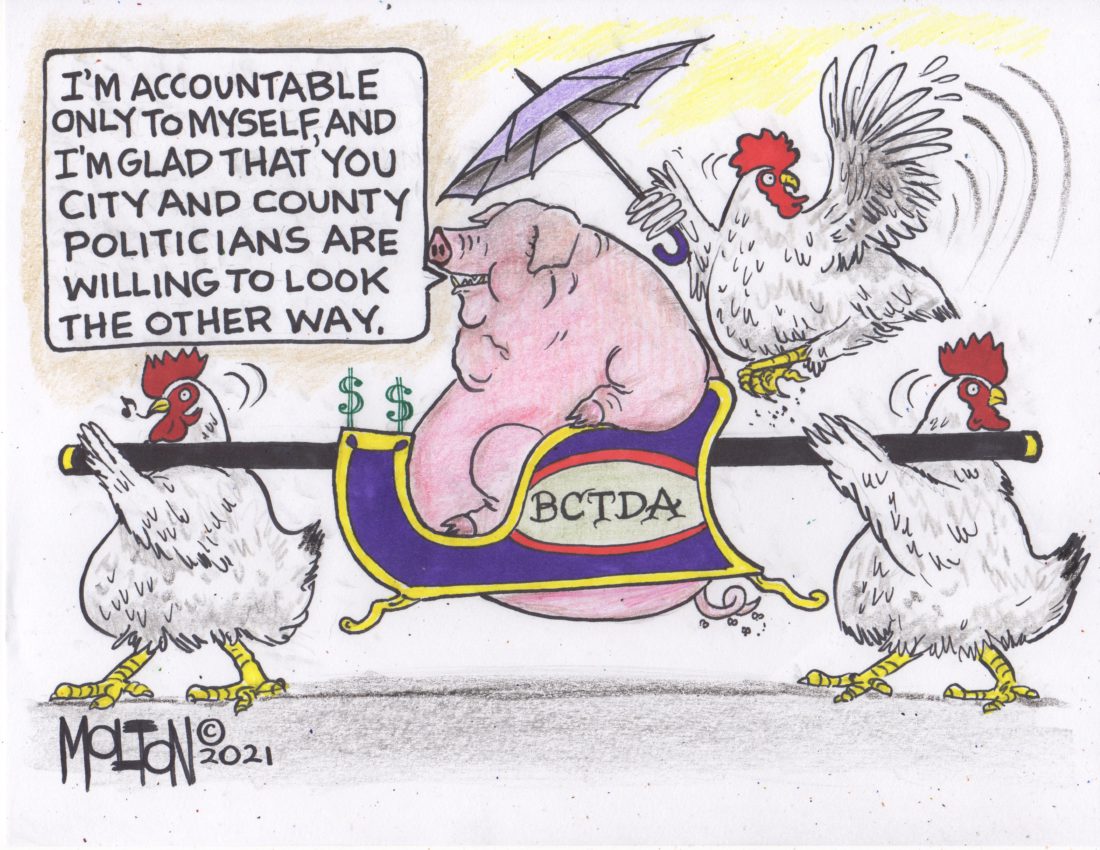
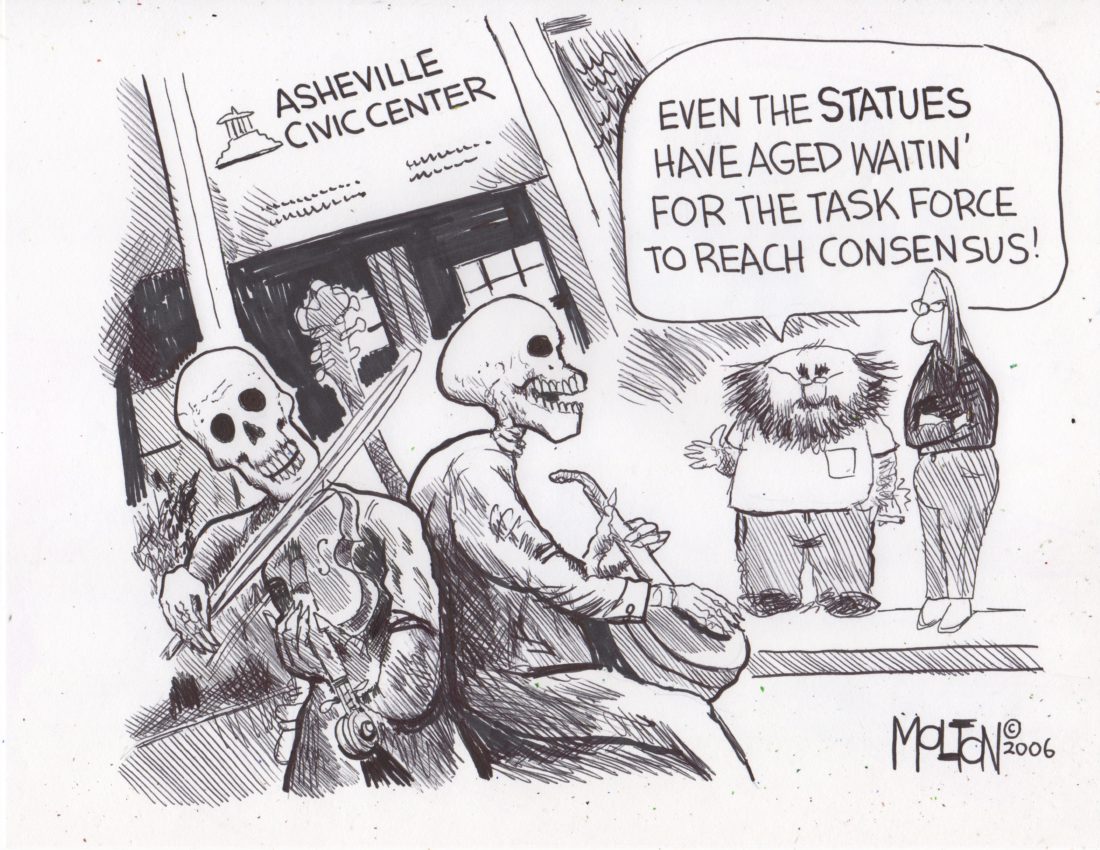

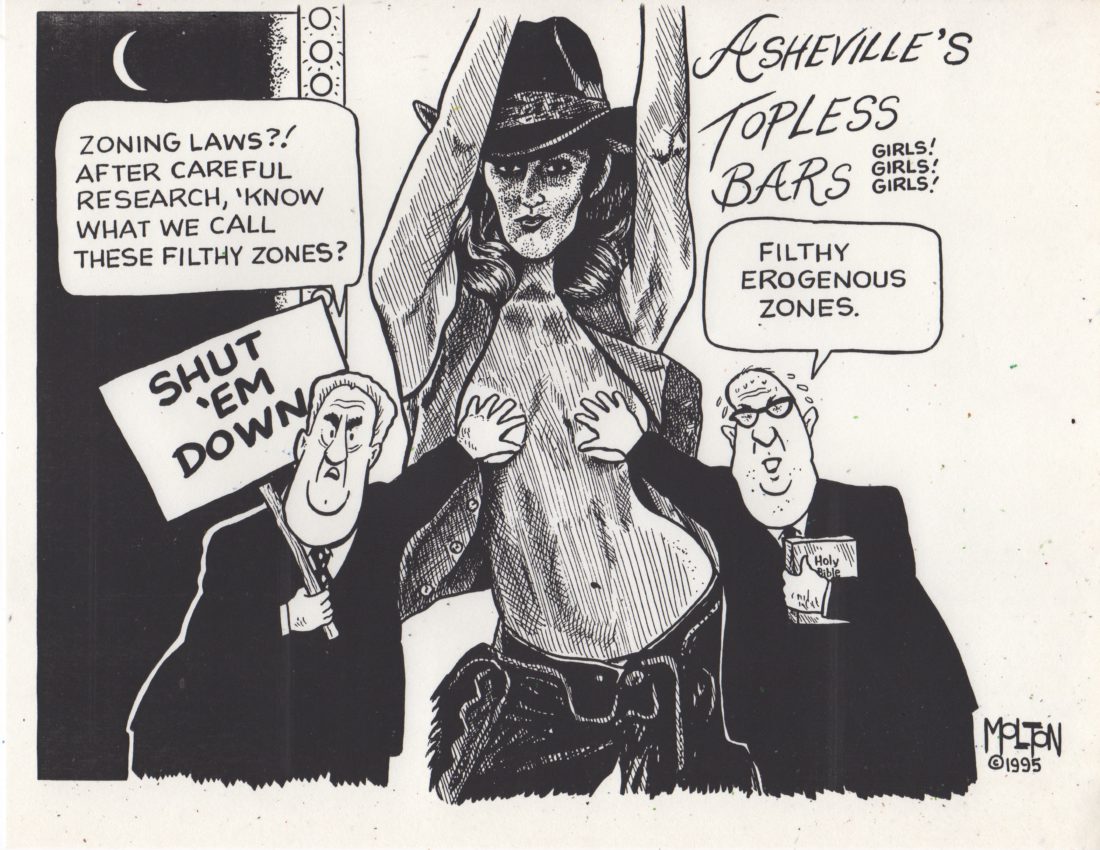
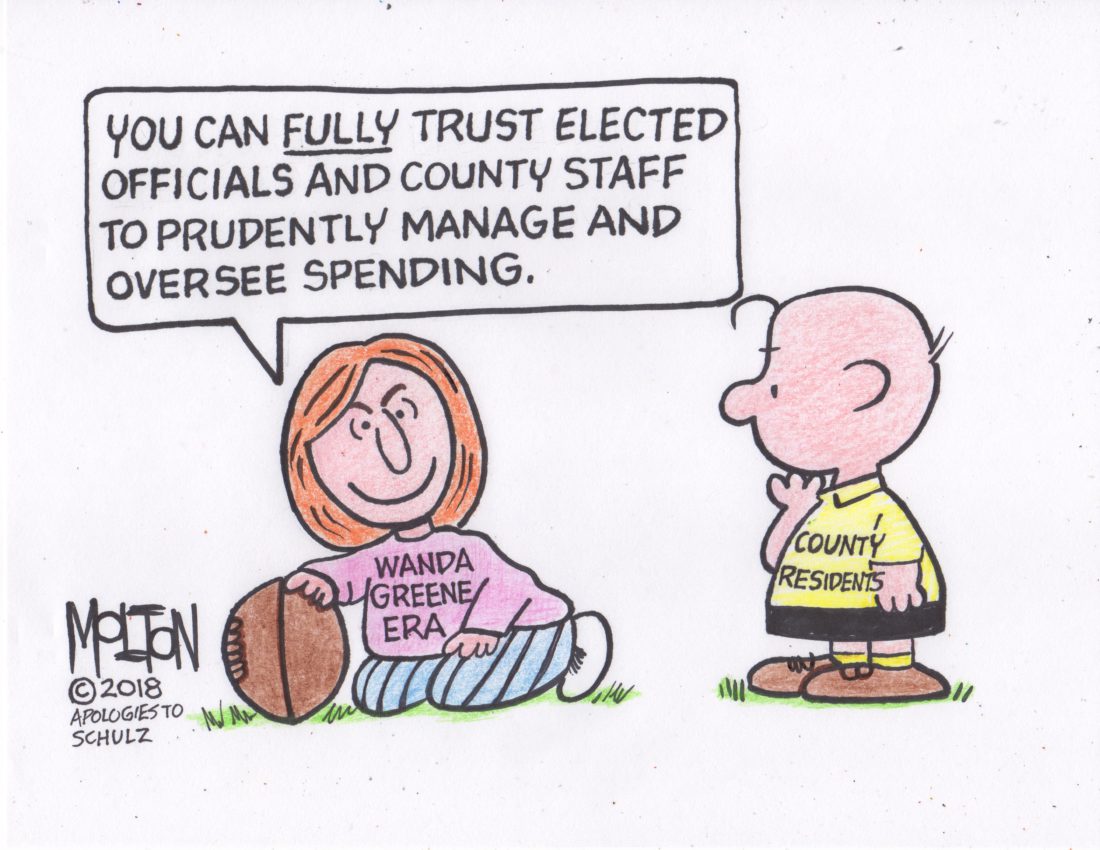
Before you comment
The comments section is here to provide a platform for civil dialogue on the issues we face together as a local community. Xpress is committed to offering this platform for all voices, but when the tone of the discussion gets nasty or strays off topic, we believe many people choose not to participate. Xpress editors are determined to moderate comments to ensure a constructive interchange is maintained. All comments judged not to be in keeping with the spirit of civil discourse will be removed and repeat violators will be banned. See here for our terms of service. Thank you for being part of this effort to promote respectful discussion.